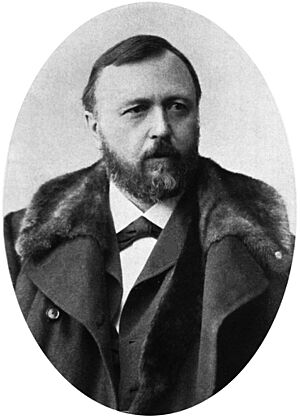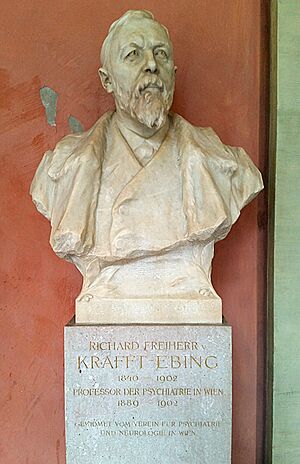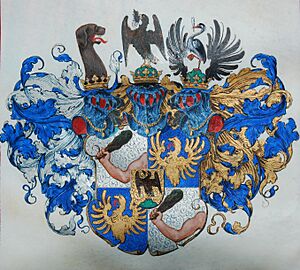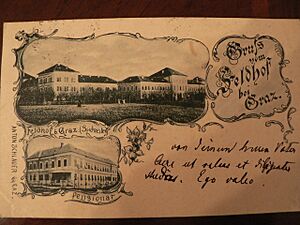Richard von Krafft-Ebing facts for kids
Quick facts for kids
Richard von Krafft-Ebing
|
|
|---|---|
 |
|
| Born |
Richard Fridolin Joseph Freiherr Krafft von Festenberg auf Frohnberg, genannt von Ebing
14 August 1840 |
| Died | 22 December 1902 (aged 62) |
| Nationality | German |
| Alma mater | University of Heidelberg |
| Scientific career | |
| Fields | Psychiatry |
| Signature | |
Richard von Krafft-Ebing (born August 14, 1840 – died December 22, 1902) was an important German psychiatrist. He is known for his work in understanding the human mind and how it relates to behavior. He wrote many books and articles that helped shape the field of psychiatry.
Contents
Life and Work of a Pioneer
Richard von Krafft-Ebing's life was dedicated to studying the human mind and helping people with mental health challenges. He became a leading expert in his field.
Early Life and Education
Richard von Krafft-Ebing was born in Mannheim, Germany. He was the oldest of five children. His father was a high-ranking official, and his mother was the daughter of a famous legal scholar. His family was part of the nobility, meaning they had a special social status.
His family moved to Heidelberg, where he studied medicine at the University of Heidelberg. This was the same university where his grandfather had taught law. In 1863, he finished his medical studies with top honors. He also earned his doctorate degree in medicine.
Starting His Medical Career
After his studies, Krafft-Ebing spent time in different cities like Vienna and Berlin. He learned about brain anatomy and how to treat people with mental and neurological problems. From 1864 to 1868, he worked at a mental hospital called Illenau. Here, he gained a lot of experience helping patients.
During this time, he also created new terms that are still used in science today. For example, he coined the term "Obsessive Thoughts." He also became good friends with a colleague named Heinrich Schüle.
In 1868, he opened his own practice as a neurologist in Baden-Baden. He even served as a doctor during the Franco-Prussian War (1870-1871). He helped wounded soldiers and studied diseases like typhus.
Professor in Strasbourg and Graz
Krafft-Ebing wanted to teach at a university. In 1872, he opened a psychiatric clinic at the University of Strasbourg. It was a small clinic at first, with only a few beds.
A year later, in 1873, he moved to Graz, Austria. He became the director of a new state asylum called Feldhof. At the same time, he was given a special teaching position (Chair of Psychiatry) at the University of Graz. He led the clinic in Graz until 1880. Later, he became a full professor of psychiatry.
Growing Fame and Important Books
Krafft-Ebing became very famous for his work. He studied how mental health was connected to criminal law. He wrote important books like Fundamentals of Criminal Psychology and Textbook of Forensic Psychopathology. His book Textbook of Psychiatry (first published in 1879) was also very well-known.

People from all over the world came to him for help. He even built a modern private clinic for his wealthier patients. In 1886, he was chosen as a member of the German National Academy of Sciences Leopoldina.
Work in Vienna
Because of his great reputation, Krafft-Ebing was invited to Vienna in 1889. He became a professor of psychiatry at the University of Vienna. He continued to publish important works, including a book on "Progressive Paralysis" in 1894. He also gave a highly respected lecture on this disease in Moscow in 1897.
He was one of the first doctors to use hypnotism to help patients. He was also often asked to be an expert in legal cases involving mental health. His work greatly influenced later researchers in the field of psychiatry.
Later Years and Legacy
At age 62, Krafft-Ebing retired due to health reasons and returned to Graz. He passed away on December 22, 1902, after suffering several strokes. He was buried in Graz and left behind his wife, two sons, and a daughter.
People remembered him as a kind and calm person who always showed great care for his patients. His calm presence often helped even the most upset patients.
Honors and Recognition
Richard von Krafft-Ebing's contributions were recognized after his death.
- In 1920, a street in Vienna was named Krafft-Ebing Street in his honor.
- There are also streets named after him in Mannheim, Germany, and Graz, Austria.
Selected Works
Here are some of the important books Richard von Krafft-Ebing wrote:
- Die Melancholie: Eine klinische Studie (1874)
- Grundzüge der Kriminalpsychologie für Juristen (second edition, 1882)
- Die progressive allgemeine Paralyse (1894)
- Nervosität und neurasthenische Zustände (1895)
Images for kids
 | William Lucy |
 | Charles Hayes |
 | Cleveland Robinson |









